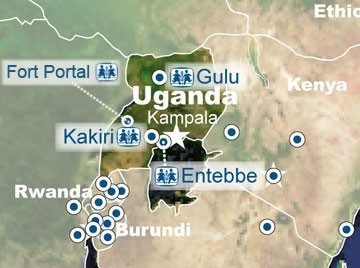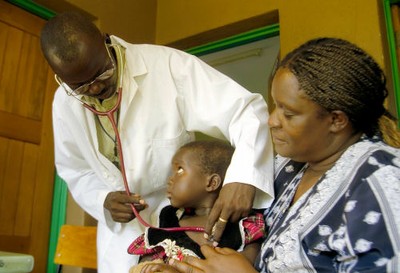SOS Children in Uganda
In 1988 we started working in Uganda. Poverty is still a major issue in the country and basic services can be hard to come by in rural areas. We work to help the most vulnerable children in Uganda stay with their families, and if needed, give them a loving home in one of our children’s villages.
With SOS Children, you can help orphaned and abandoned children in Uganda by sponsoring a child:
Sponsor a child in UgandaWidespread poverty continues to affect the lives of many in Uganda
Life in rural areas is extremely challenging in Uganda. The climate means that droughts are common, so food availability is uncertain. Only 38% of Ugandans have access to safe drinking water and over 50% of people survive on less than $1.25 a day.
With a HIV prevalence rate of 16%, Uganda has one of the highest rates of HIV/AIDS in the world. 150,000 children live with the disease, despite attempts to lower the cases of mother-to-child transmission.
Children in Uganda
- Nearly three million children in Uganda have lost one or both parents, around half due to the HIV/AIDS epidemic in the country. Due to a number of factors, including war, natural disasters, civil strife and the HIV/AIDS epidemic, it is estimated that 42,000 children head households. An estimated 10,000 children roam the streets of Ugandan cities, scavenging and begging in order to survive.
- The under-five mortality rate is 128 per 1,000 live births, as many preventable diseases infect young children and medical care both at birth and in infancy is often not available.
 Our charity work in Uganda
Our charity work in Uganda
Kakiri
We began work on the first Ugandan community in 1988 in Kakiri, a small market town in the Lowero triangle, 15 miles North West of the capital Kampala. The area was chosen because this part of Uganda suffered most from the war in 1986 which virtually destroyed the town's infrastructure. SOS Children's Village Kakiri has 13 family houses for 130 orphaned and abandoned children and three SOS Youth Homes where 30 older children can live in relative autonomy while they take their first guided steps towards independent lives. The community will be their home until they are ready and able to support themselves.
The SOS Nursery, for 100 little children from the SOS Children’s Village and the local community, has four classrooms and a playground. Providing an education for older children too, the SOS Primary and Secondary School can take nearly 500 pupils from the Village and the surrounding community, the poorest of whom are awarded scholarships to attend.
Over 6,000 patients are treated each year at the SOS Medical Centre. This Centre offers HIV / AIDS support to those infected with the virus, and runs AIDS prevention workshops in the community and in schools. 480 children and their families in Kakiri also benefit from our Family Strengthening Programme. This programme exists to increase the capability of struggling families to care for their children, thus preventing child abandonment. We provide school fees, food packages, counselling and skills training to caregivers so they can earn money and support their children in the long-term.
Entebbe
Our second SOS Children's Village opened in 2003 in Entebbe, the country's second largest city. It has 12 family houses for 120 children. It also has lots of grassy areas for the children to play together, as well as trees to shelter the houses from the heat. 90 children also attend the SOS Nursery School located on the Village site, which has four classrooms and a playground. Opened in 2008, an SOS Social Centre here supports up to 600 children and their parents to stay together.
Gulu
In June 2002, we began an Emergency Relief Programme in Gulu in the North of the country, in order to help refugee children and ex-child soldiers drawn into the violence perpetrated by the Lord’s Resistance Army (LRA). Over 20,000 children were abducted by the LRA, mainly to be used as soldiers or sex slaves. Our emergency programme evolved into an SOS Social Centre to help orphaned and vulnerable children and their families. An SOS Children’s Village was opened here in May 2009 to give family homes to 120 refugee children who could not be reunited with their families. An SOS Medical Centre in the town also provides healthcare, counselling, HIV/AIDS support and workshops to over 10,000 people every year.
 Fort Portal
Fort Portal
SOS Children’s Village Fort Portal opened in 2010 and comprises twelve family houses to care for approximately 120 children. It also includes a village director's house, an aunts' house (SOS aunts take care of the children during their SOS mothers’ absence), a “tukul”, which is an African hut to hold events, a co-workers' house and an administration and service area.
The SOS Children’s Village also includes an SOS Nursery which accommodates 100 children.
In 2009, before the SOS Children’s Village started caring for children, an SOS Family Strengthening Programme was started in Fort Portal. About 1,600 children and their family members benefit from this programme per year.
Aids Orphans in Uganda
Life in SOS Children's Villages Uganda: John's Story
 "Dying on his feet" is how the village director at SOS Children's Village Entebbe described four-year-old John when she first saw him. "If we had left him there, I am sure he would be dead by now."
"Dying on his feet" is how the village director at SOS Children's Village Entebbe described four-year-old John when she first saw him. "If we had left him there, I am sure he would be dead by now."
John lived with his father and older brother in a very poor part of western Uganda. When SOS Children first found him, he could not talk, he had a very big stomach, he had jiggers (parasitic insects that lay eggs under the skin) all over him and he was shaking like he had a fever. The father didn't care - he didn't even know John's other name. It was as if everyone was waiting for John to die.
When he arrived at the village, John had a blank stare and would not speak. He was very malnourished. The doctor prescribed treatment for jiggers and discovered he also had malaria. His new SOS mother, Mary, said he could not eat properly because of the jiggers. He also had bad nose bleeds. "I really nursed him", said Mary, "and he changed bit by bit”. Every morning, Mary asked John how he was; finally one day, after nearly three months, he answered her: "Fine”.
John is now gaining confidence and he can answer questions, he can hold a pencil and he is doing well in school. Looking at him as he sits with his SOS siblings around the dining room table you would never know the agony and trauma that he suffered in his first years of life. He is just like the others: curious, chatty, smiling, and sometimes naughty!
Local Contact
SOS Children's Village of Uganda Trust
P.O.Box 27510Kampala
Uganda
Tel:+256/414/322247, +256/414/322249
Fax:+256/414/322248
e-mail:nationaloffice@sosuganda.org

 Return to Schools Wikipedia Home page…
Return to Schools Wikipedia Home page…
